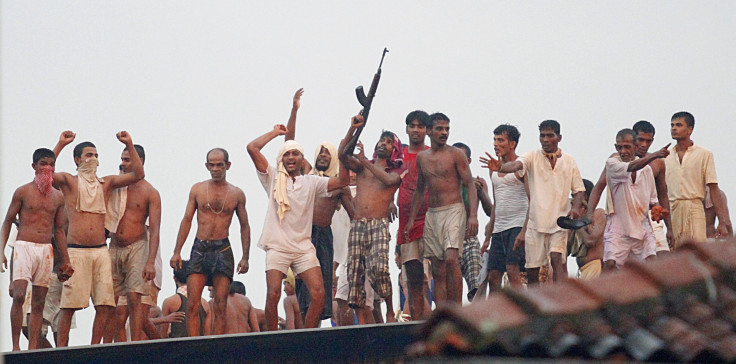Despite Wave Of Violent Crime, Sri Lanka Remains Wary About Death Penalty

The South Asian island nation of Sri Lanka, which emerged from the ruins of a 30-year civil war only four years ago, is now contending with a rise in violent crime, including murders, which has renewed talk from some politicians who want to implement capital punishment.
The death penalty is on the books in Sri Lankan jurisprudence -- indeed, rapists, murderers and drug dealers are handed the ultimate verdict routinely, but no executions have been carried out in the country since 1976.
For example, earlier this month, the operator of a private passenger bus who was blamed for negligence in an accident that killed 41 people was sentenced to death by a high court. Another 461 prisoners are languishing in Sri Lanka prisons, awaiting the hangman’s noose -- some for as long as a quarter-century -- with no knowledge of their impending fates, trapped in a kind of limbo.
C. Pallegama, the new chief of the country’s prison system, said he wants to resolve the legal status of inmates condemned to death.
"Personally I don't agree with capital punishment," Pallegama told the BBC.
"Some [death row] prisoners have completed 20 years, 24 years, so there is a problem -- their unrest, their stress."
Pallegama was referring to a number of prison riots that have resulted in the deaths of dozens of inmates and raised questions about the culpability of prison guards and security officials brought in to quell the disturbances.
Pallegama, who has met personally with death row prisoners, said the prisoners had "been given severe punishments" and were "suffering,” adding that they either want to be executed or formally sentenced to life in prison. (Death row prisoners in Sri Lanka typically have their terms commuted to life sentences, but many remain in legal limbo).
Meanwhile, some prominent Sri Lankan lawmakers have openly called for the execution of condemned prisoners.
Tissa Karaliyadda, Child Development and Women’s Affairs Minister, told The Nation that the death penalty should automatically be applied to convicted rapists.
Similarly, Media Minister Keheliya Rambukwella told the Daily News paper: “The death penalty should be implemented for child molesters and drug lords.”
Their voices, often supported by the mass media and even religious figures, come amid horrific bloodshed in what was once an island paradise -- Sri Lanka reports at least 750 homicides annually (including some particularly brutal murders of children and the elderly) and untold thousands of sexual assaults and cases of child abuse.
In a broader context, the civil war between the majority Sinhalese government troops and Tamil rebel separatists hangs over the question of capital punishment. Although no ‘Tamil Tigers’ are presently on death row, the Sri Lankan government military’s history of murdering, torturing and summarily executing rebels during the final weeks of the war would suggest that the state (including its armies of "death squads") has never really stopped the killing of what it perceives to be “criminals.”
Some critics blame the rising tide of violence on the legacy of that civil war, as well as a growing wealth gap in Sri Lanka.
“The brutalizing impact of civil war has been compounded by a worsening economic crisis that is deepening the social divide between rich and poor, and creating festering social problems,” wrote Sanjaya Jayasekera for the World Socialist Web Site.
“Many of the murders, often of rape victims, are taking place in rural areas where poverty is rampant. Almost a quarter of Sri Lankans live below the official poverty line, and four-fifths of the poor live in rural areas.”
Jayasekera also accuses soldiers (some with ties to ruling politicians and organized crime figures) who fought in the civil war of committing many of the violent crimes attributed to so-called “common criminals.”
“Over the past two decades, around 65,000 soldiers deserted the army,” he said.
“Some 36,400 of them have been arrested since the end of the war in 2009. Many who remain at large belong to an extensive criminal underworld with close connections to politicians, from the local level right up to government ministers. As well as being involved in drug peddling and other forms of organized crime, these thugs carry out political violence in return for protection.”
Meanwhile, the Colombo government continues to hem and haw over its view of the death penalty.
Sri Lanka even abstained on a vote in December 2012 at the UN General Assembly that called for global moratorium of capital punishment.
© Copyright IBTimes 2025. All rights reserved.





















